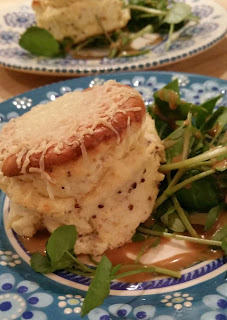(Serves 12-14)
This is a great Tart to make in
advance and it can be left to set and used the next day. We can't completely take the credit for this one though...it is based on
Nigella Lawson's Salted Chocolate Tart. However, for variation we have made it with
Cardamom and it has gone down a storm.
You will need: 1 x 23cm / 10in
deep-sided (approx. 5cm / 2in deep), loose-bottomed flan tin.
Ingredients:
For the base:
28 Oreo cookies (2 x 154g packets)
50 grams dark chocolate (min. 70% cocoa solids)
50 grams soft unsalted butter
½ teaspoon smoked sea salt flakes
50 grams dark chocolate (min. 70% cocoa solids)
50 grams soft unsalted butter
½ teaspoon smoked sea salt flakes
For the filling:
100 grams dark chocolate (min. 70% cocoa solids)
25 grams cornflour
60 ml full fat milk
500 ml double cream
50 grams cocoa (sieved)
2 teaspoons instant espresso powder (or strong instant coffee powder)
75 grams caster sugar
4 Cardamom pods
2 teaspoons extra virgin olive oil
25 grams cornflour
60 ml full fat milk
500 ml double cream
50 grams cocoa (sieved)
2 teaspoons instant espresso powder (or strong instant coffee powder)
75 grams caster sugar
4 Cardamom pods
2 teaspoons extra virgin olive oil
Methods:
For the base:
- Snap 50g of the chocolate and the
biscuits into pieces and drop them into the bowl of a food processor.
Blitz until you have crumbs.
- Add the butter and salt, and blitz
again until the mixture starts to clump together. (If you’re doing this by
hand, bash the biscuits in a freezer bag until they form crumbs, finely
chop the chocolate and melt the butter, then mix everything, along with
the salt, in a large bowl with a wooden spoon or your hands encased in
disposable vinyl gloves.)
- Press mixture into your tart tin
and pat down on the bottom and up the sides of the tin with your hands or
the back of a spoon, so that the base and sides are evenly lined and
smooth.
- Put into the fridge to chill and
harden for at least 1 hour, or 2 hours if your fridge is stacked. We
wouldn’t keep it for longer than a day like this as the Oreo crust tends
to get too crumbly.
For the filling:
- Take the Cardamom pods, remove the
outer husks and crush the seeds in a pestle and mortar until the
seeds are as powdery as possible.
- Finely chop the 100g of chocolate.
Put the cornflour into a cup and whisk in the milk until smooth.
- Pour the cream into a heavy-based
saucepan into which all the ingredients can fit and be stirred without
splashing out of the pan, then add the finely chopped chocolate, the
cardamom, the sieved cocoa (or just sieve it straight in), espresso or
instant coffee powder, sugar and olive oil. Place over a medium to low
heat and whisk gently – we use a very small whisk for this, as we are not
aiming to get air in the mixture, just trying to banish any lumpiness – as
the cream heats and the chocolate starts melting.
- Off the heat, whisk in the
cornflour and milk mixture until it, too, is smoothly incorporated, and
put the pan back on a low heat. With a wooden spoon, keep stirring until
the mixture thickens, which it will do around the 10-minute mark, but be
prepared for it to take a few minutes more or less. Take the pan off the
heat every so often, still stirring, so that everything melds together,
without the cream coming to a boil. When ready, it should be thick enough
to coat the back of a wooden spoon, and if you run your finger through it
(across the back of the spoon) the line should stay.
- Pour into a wide measuring jug or
batter jug (it should come to about the 600ml/2 ½-cup mark). Now run a
piece of baking parchment or greaseproof paper under the cold tap, wring
it out and place the damp, crumpled piece right on top of the chocolate
mixture, then put the jug into the fridge for 15 minutes. The mixture will
still be warm, but will be the right temperature to ooze into the base
without melting it.
- Pour and scrape the mixture into
the biscuit-lined flan tin and put back in the fridge overnight to set. If
you wish to eat the tart within 24 hours you can leave it in the fridge.
If you would like to make it further in advance then leave the tart to set
and then transfer it to the freezer for when you need it. Once thawed it
should be used as soon as possible or the base with loose it's crispness.
- Remove from fridge 10 minutes
before serving, but unmould straight away. (Sit the flan tin on top of a
large tin or jar and let the ring part fall away, then transfer the tart
to a plate or board, leaving the tin base still on the bottom.)
- Slice modestly – this is rich and
sweet, and people can always come back for more – and serve with crème
fraîche.
Hints, Tips and
Alternatives:
- If you are not a fan of the
'salted' craze, just leave the salt out for a pure chocolatey delight.
- If you like a bit more of a kick,
like we do, then use 5 cardamom pods!








